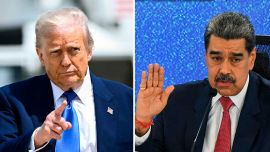Benjamin Gedan, a former South America director on the National Security Council under the Barack Obama administration, is the director of the Argentine Project, an initiative sponsored by the Woodrow Wilson International Center for Scholars, one of the United States’ top think-tanks.
The Argentina Project was created last year with the intention of becoming a leading provider of policy research on the current economic and political reforms undergoing in Argentina.
In a recent interview with the Times from the Wilson Center’s headquarters in Washington DC (conducted prior to former US secretary of state Rex Tillerson’s departure from office and the row over US tariffs on steel and aluminium), Gedan, a Latin American foreign policy expert and adjunct professor at John Hopkins University, expanded on his organisation’s mission, offered an analysis of Argentina’s current political climate and its relations with the United States.
Although he praised some of the policy-level changes implemented by President Mauricio Macri’s administration, Gedan pointed to the numerous challenges the country still faces in improving its economy.
The former White House official was also critical of the Donald Trump administration’s ‘America First’ approach and its foreign policy toward Argentina, saying he hoped that the US government would start focusing on “what we can do to help this model succeed.”
How did the Wilson Center’s Argentine Project come about?
There was a desire here to take advantage of the interest in Argentina, to create a more productive diplomatic relationship by establishing a programme in the Wilson Center. Programmes had already been designed for Brazil and Mexico, as they are the largest countries in the region that historically have had the most important for the private sector.
Before, there was very little interest in Argentina, especially since the US private sector couldn’t operate in the country. But now, with the new change in attitude, we saw a need for a programme like this as the private sector has a great interest in expanding relations, along with the US government. That is where we come in, and the idea is to focus on Argentina, to provide the intellectual foundations for the relations, to be the inside source for the private sector, the US government, the reform process, the diplomats, for Argentina.
What is the organisation currently working on?
We are helping organise the G20 talks about global issues, through an Argentine perspective. How Argentina is managing the agenda of these global issues.
We structure the programme through events, convening experts on subjects of interests to Argentina watchers, as well as senior Argentine officials discussing issues that express the government’s viewpoint. We helped launch the Argentine congressional caucus. We also contribute to this historic movement with the Weekly Asado [the Argentina Project’s newsletter], a weekly podcast that takes a look at Argentine issues such as [former Planning minister Julio] De Vido’s imprisonment, a recent analysis of inflation challenges, transportation... this is the nature of it.
We frequently publish in major US publications such as Americas Quarterly or The Hill. We are using all of these tools at our disposal to communicate to a broader audience about Argentina. The goal is to be a central source of information on Argentina’s reform movement.
How was the Wilson Center involved in the creation of the Argentine congressional caucus?
We were a driver in establishing this caucus and were privileged to host its launch. The co-chair of the caucus, Republican congressman Michael McCaul said, “I wanted to thank the Wilson Center for hosting this, and also for your leadership in really being the spearhead for this caucus.” Argentine and US lawmakers, senior Democrats and Republicans, such as Representative Jeff Duncan, as well as private sector folks participated in it.
The caucus aims to help construct a relationship with Argentina, given its unpredictability, within the role of the [US] State Department and other institutions. This could affect the foreign assistance given to Argentina and provides an opportunity to expand relations in the US Congress.
Symbolically it’s very important and also in reality.
How important to do you think lobbying is for Argentina?
I think after going through the Kirchner period [the governments led by Néstor Kirchner and Cristina Fernández de Kirchner], it is hard to change the perception of Argentina overnight, as it was for a very long period.
This will gradually change to the extent that Argentina tells its story, which now has a very different orientation. Even though it has been two years, it has been an uphill battle to communicate that Argentina is open to international trade. This makes the broader programme invaluable. Before, when Argentina didn’t have a good relationship with the US government, it was viewed through three prisms.
What were they?
The first prism was Iran and its relationship with Argentina. The relationship with Venezuela and the company it kept in the hemisphere was seen as hostile to the US, as it balanced the United States’ role in the region on a variety of subjects and it had the explicit policy to diminish it. And the holdout bondholders had a disproportionate influence on the US Congress promoting negative views. The work we do that benefits Argentina is to provide analysis and Argentina has work to do – and they know it.
And what prism are observers starting to look at Argentina through now?
I think it’s perversely reversed with those who track foreign policy issues. Argentina is now perceived as the number one ally in Latin America because of its new approach to Venezuela, the OAS [Organisation of American States] leadership, the Lima Group, and how helpful it has been.
The commercial community, businesses, and governments are seeing Argentina very positively after the midterm elections and that they’ve had their key moment in their business climate.
The caveat, however, is that investors have long memories – although they are broadly satisfied with the changes there is much less confidence that it is sustainable. And I know Argentines are frustrated – they had an election in 2015-2016, the currency was devalued, they settled with the holdout bondholders, lowered export taxes.
From the Argentine side, it’s understandable, and the investors are also justified – there is 25 percent inflation, the government budget is being reduced, but they are borrowing billions of dollars per year, and the politics remain divided. The positive story is how well [the] Let’s Change (Cambiemos) [coalition] has performed, and the second is that moderation persists. Yes, the second-highest number of votes went to CFK [former president Cristina Fernández de Kirchner] and her movement. There is a challenge, to show that CFK isn’t president and that there is a consensus to create some real structural changes.
A lot of the goals are far from guaranteed, but we do try to provide policy guidance and the US is being supportive in the best way, with investments, and the right decisions are being made.
Critics of the Macri administration’s policy toward the United States say that he is giving too many trade concessions for very little in return. What is your opinion?
Yes, I worked in the previous administration, and I completely agree. When Barack Obama was in the White House, he said that the United States stood ready to work with Argentina in any way we can. This is no longer true in my opinion. What Obama meant was that we see a long-term benefit in the success of the Macri government, in improving the political and economic climate in Argentina, given the region’s history of populist and closed economies, instead of governments that are protrade or demonstrate a pro-market approach. The US administration thought that this was very valuable in the long term – to support Argentina was not to ask anything in return.
The new Trump administration, in my view, recognises and appreciates the value in Argentina but is unwilling to lift a finger to help Macri, beyond very public flattering statements. “That we are great friends,” or visits by Vice-President [Mike] Pence, or have a series of high-level engagements... that is very flattering. But when push comes to shove, many key commercial issues haven’t been addressed. In my opinion, this is a very short-sighted approach.
Security Minister Patricia Bullrich was recently promised funding....
Its likely pennies, what Bullrich will receive for security assistance. Overall, the White House is planning to reduce foreign aid. The White House budget request is to cut 36 percent to humanitarian assistance accounts.
What is your opinion about China’s presence in Argentina and the region?
The mammoth investment China provides, in a region that requires infrastructure investment, is inevitable. But the Trump administration’s foreign policy is speeding China’s growing role in Latin America. If [Rex] Tillerson thought he could bully the region, it brings legitimate problems, and that reality has very little to offer – an unpopular president who is disliked in the region, providing very little structure in finance, expertise, credit, and energy. And I say this with all the problems that Chinese investment brings. It can increase corruption, insensitivity to labour rights and is not necessarily the project that is ideal for these economies.
The non-conditionality of Chinese lending, as you can see in how it’s propping up Venezuela, can be very problematic for the region. Latin America should be cautious with China.
What would be the best approach, in terms of the US government’s foreign policy toward Argentina?
The Obama’s administration approach was to look at the long-term in benefits to the United States and prioritise the Argentine government over the short term. A successful Argentina offers extraordinary opportunities for business and a model to create a great ally. The approach was a long-term desire to help the Argentine government get through its most difficult phase.
The Trump administration is unwilling to lift a finger to assist this government and in fact, has damaged this government. The US administration is inconsistent with its remarks and commerce. Argentina is a vital partner of the US, and we should do what we can to help this model succeed instead of emphasising this America First position.


























Comments